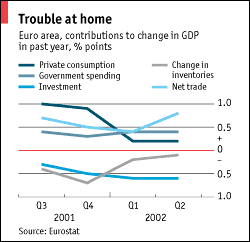|
|
||||||
 | |
A FEW months ago, economists were forecasting steady recovery for the euro area. Oops. The zone's economy grew by only 0.4% in the first quarter and 0.3% in the second; the third is looking bad too. This week came news of a sharp fall in French industrial production in July and a rise in euro-zone inflation to 2.1% in August, above the goal of the European Central Bank (ECB). The bank, no softie anyway, is now less likely to cut interest rates. Europe's equity markets, already battered by global gloom, slumped. Germany's blue-chip Dax 30 index dropped 5% on September 18th, hitting a five-and-a-half-year low, and France's CAC 40 fell by 3.6%.
Slow growth has not only caught out the pundits: it is straining the euro-area's budgetary rules, the “stability and growth pact”. The idea of the pact is to prevent governments running loose fiscal policies at the expense of other euro-area countries. This could happen through higher interest rates if the ECB offset fiscal laxity with tighter monetary policy; or by a higher risk premium on euro-area government bonds.
The Maastricht treaty, which laid down the rules for euro membership, says that governments may not have budget deficits of more than 3% of GDP, except in a “severe economic downturn”, defined as a drop in GDP of more than 2% in a year, or when some other “unusual event” blights their finances. On top of this, governments are supposed to keep their budgets near to balance, allowing for cyclical fluctuations.
Four of the 12 euro-area governments—the three biggest, Germany, France and Italy, plus little Portugal—are off target. Earlier this year, they promised to bring their budgets “close to balance” by 2004. But the laggards are being pushed away from balance in 2004, not towards it, and they do not seem to care. Germany, in effect, is aiming for 2006. France's commitment to 2004 is conditional on economic growth of 3% in 2003, which looks out of reach. Moreover, its finance minister wants to cut taxes. So does Italy's. The Italian deficit, despite an official forecast of 1.1% for 2002, will probably be well over 2% both this year and next.
Letting the 2004 deadline slip makes sense. For a year or more, the euro area has been suffering from chronic weakness in domestic demand. Consumer spending is feeble in Germany and Italy; it is stronger in France, but could be weakened there by rising unemployment. Investment has also been frail: its weakness in the second quarter of this year cancelled out slightly perkier consumption. In effect, net exports have kept the euro economy going. Tighter fiscal policy may be the only way of hitting the 2004 target. Yet, with demand so weak, it is the last thing the euro area needs.
The sacred 3% limit for budget deficits, already burst by Portugal last year, will probably be breached by Germany this year. Weak economic growth could tip France over in 2003. Transgression can have dire consequences. The European Union's finance ministers are supposed to make recommendations intended to wipe out the excess deficit the year after its discovery. If the offending government does not comply, it has to lodge a deposit, at zero interest, of between 0.2% and 0.5% of GDP with the European Commission. If the sin is not corrected within two years, the deposit is converted to a fine.
Italy would like the pact to be eased. The French and German governments surely would too, though they are less vocal about it. The ECB, however, growls at any sign of weakness. Wim Duisenberg, its president, said recently that “countries with remaining imbalances must avoid deficits in excess of 3% of GDP and implement determined policies in order to progress towards budgets close to balance or in surplus.”
David Walton, an economist at Goldman Sachs, says that the pact aims at the wrong thing. It makes no sense, he says, for all the euro area's governments to aim at budget balance no matter how much debt they carry. A rule intended to stabilise government debt at 60% of GDP, one of the Maastricht criteria for joining the euro, would allow most governments (but not Italy's, a big debtor) to run a small deficit most of the time and permit occasional deficits of more than 3%. Mr Walton thinks that this could be done without changing the treaty.
But would it help? Markets might see an easing of the pact, daft as it is, as a sign that ministers have no real interest in balancing their books. So delinquent countries would be punished either way.
|
Copyright © 2002 The Economist Newspaper and The Economist Group. All rights reserved. |